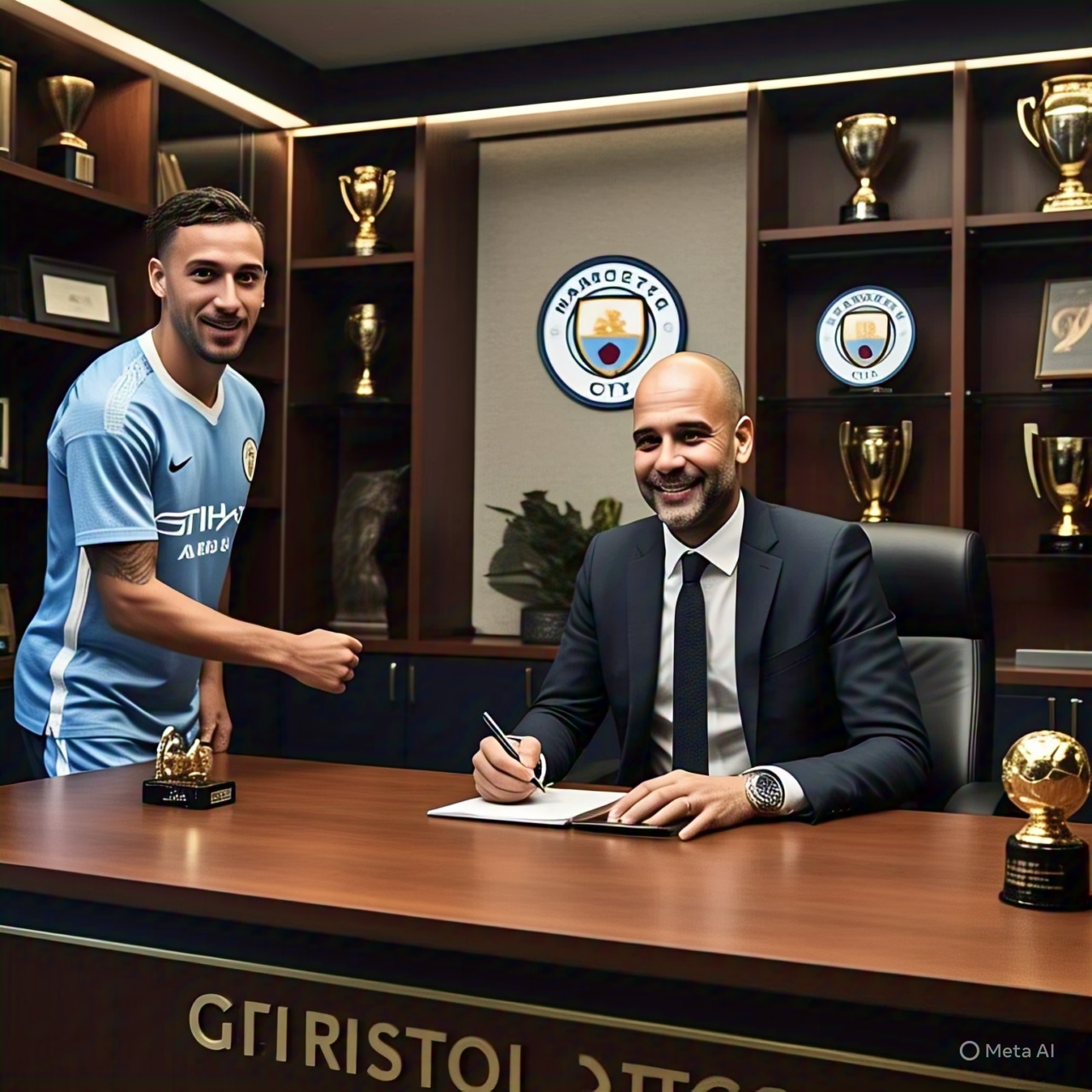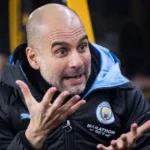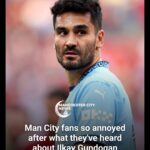Pep Guardiola’s claim over second Man City transfer exit

The summer transfer window of 2025 has brought with it the familiar rhythms of speculation, ambition, and uncertainty that define modern football. At the center of one of the most intriguing narratives stands Ilkay Gundogan, the 34-year-old German midfielder whose relationship with Manchester City has become one of the most compelling stories in recent football history. As Turkish giants Galatasaray circle with increasing intensity and Pep Guardiola hints at the possibility of another departure, Gundogan himself has provided a defiant response that speaks to the enduring spirit of a player who refuses to accept that his best days are behind him.
The situation unfolding at the Etihad Stadium represents more than a simple transfer saga; it embodies the eternal struggle between ambition and pragmatism, between the heart’s desire to continue and the mind’s acceptance of natural progression. Gundogan’s declaration that he wants to stay and fight for his place at Manchester City comes at a time when the club’s squad depth has reached unprecedented levels, creating a competitive environment that would challenge even the most established players.
The Context of Competition
Manchester City’s current squad composition presents a fascinating study in modern football management. With Pep Guardiola’s recent acquisitions and the natural evolution of the team’s tactical approach, the competition for midfield positions has intensified dramatically. The Spanish manager’s comments about potentially having “sad” players if the squad remains too large hint at the difficult decisions that lie ahead. This is not merely about talent evaluation; it’s about managing human emotions and maintaining the delicate balance that has made City one of the world’s most successful clubs.
The mathematical reality is stark: with 27 players currently in the squad and the practical limitations of providing meaningful game time to all, some departures appear inevitable. Guardiola’s experience tells him that unhappy players can disrupt team chemistry, regardless of their individual quality. This creates a paradox for players like Gundogan, who possess both the skill to contribute and the dignity to expect regular opportunities.
Recent reports have suggested that Galatasaray have reached an agreement over personal terms with Manchester City midfielder Ilkay Gundogan over a summer move, according to L’Equipe. However, the Turkish giants have yet to initiate formal discussions with Manchester City themselves, though the Premier League champions are reportedly open to facilitating his departure. This development adds another layer of complexity to Gundogan’s situation, as it suggests that while opportunities exist elsewhere, the final decision remains very much in his hands.
The Galatasaray Temptation
The interest from Galatasaray represents more than just another transfer opportunity; it offers Gundogan a chance to connect with his Turkish heritage while maintaining his status as a key player. The Turkish champions have reportedly offered him a lucrative package that would see him become one of their highest-paid players, with a two-year contract, offering 150,000 pounds per week. For a player at this stage of his career, such an offer represents both financial security and the guarantee of playing time that may be increasingly difficult to secure at the highest level of European football.
The cultural connection cannot be understated. Gundogan’s Turkish roots, through his parents who settled in Germany before his birth, create a natural affinity with the Istanbul club. His previous meetings with Turkish President Recep Tayyip Erdoğan demonstrate the respect he commands in Turkey, and a move to Galatasaray would complete a circle that began with his family’s migration story decades ago.
Yet the allure of guaranteed first-team football must be weighed against the unique environment that Guardiola has created at Manchester City. The relationship between player and manager transcends the typical professional dynamic, built on years of mutual respect and shared success. Gundogan’s own words about wanting to work with Guardiola in a coaching capacity after his playing career ends reveal the depth of this connection.
Guardiola’s Complex Calculations
Pep Guardiola’s approach to squad management has always been characterized by ruthless efficiency tempered by genuine affection for his players. His recent comments about potentially trimming the squad to avoid having “sad” players reflect a manager who understands that happiness and performance are inextricably linked. The challenge lies in making decisions that serve both the immediate tactical needs of the team and the long-term well-being of individuals who have contributed significantly to the club’s success.
The manager’s hint that Gundogan might be allowed to leave should not be interpreted as a lack of appreciation for the midfielder’s contributions. Rather, it reflects the harsh realities of modern football, where even the most successful clubs must constantly evolve to maintain their competitive edge. Gundogan’s game time will dwindle next season, with Pep Guardiola looking towards the future, according to recent reports, suggesting that the manager’s planning is already incorporating this reality.
The timing of these discussions is particularly poignant given that Manchester City star Ilkay Gundogan triggered an option for one more season at the Etihad Stadium, demonstrating his commitment to remaining at the club. This creates a situation where both player and manager must navigate between contractual obligations and practical considerations.
The Player’s Perspective
From Gundogan’s standpoint, the decision represents a crossroads that will define the final chapter of his illustrious career. His insistence that he wants to stay and fight for his place at Manchester City speaks to a competitive spirit that has never dimmed, even as he approaches his 35th birthday. The midfielder’s recent performances, including his crucial contributions during City’s Club World Cup campaign, demonstrate that his technical abilities remain largely intact.
His comments following City’s 6-0 victory over Al Ain in their Club World Cup group match revealed both his determination and his realistic assessment of his situation. “I have a one year contract. And I’m very happy here. I think everyone knows that. And I am committed to the competition,” he stated, before adding, “And I’m enjoying my football. I still believe that I…” The truncated nature of this quote perhaps reflects the ongoing internal debate he faces regarding his future.
The privilege of working under Guardiola continues to motivate Gundogan, as he has repeatedly expressed his appreciation for the tactical education he receives daily. This relationship extends beyond mere professional courtesy; it represents a meeting of minds between two individuals who share a deep understanding of football’s complexities. The prospect of transitioning into coaching under Guardiola’s guidance adds another dimension to his decision-making process.
The Tactical Evolution
Manchester City’s tactical evolution under Guardiola has created new challenges for established players like Gundogan. The manager’s recent acquisitions of players like Rayan Cherki, Rayan Aït-Nouri, Tijjani Reijnders, and Marcus, alongside the continued development of younger squad members, has shifted the competitive landscape within the squad. The integration of these new talents requires careful management of playing time and role definition.
Gundogan’s versatility has long been one of his greatest assets, allowing him to function effectively in multiple midfield positions and adapt to various tactical configurations. However, this same versatility can become a disadvantage when specialist roles are available, as managers may prefer players who excel in specific positions rather than those who are merely adequate in several.
The physical demands of Guardiola’s system also present ongoing challenges for a player of Gundogan’s age. The intense pressing, quick transitions, and high-tempo football that characterize City’s play require peak physical condition and rapid recovery between matches. While Gundogan has maintained impressive fitness levels throughout his career, the cumulative effect of years at the highest level inevitably takes its toll.
The Broader Context of Modern Football
Gundogan’s situation reflects broader trends in contemporary football, where squad management has become increasingly complex due to financial regulations, competitive demands, and player expectations. The challenge of maintaining squad harmony while pursuing success at the highest level requires delicate balancing acts that even the most experienced managers find difficult to navigate.
The concept of “sad” players that Guardiola referenced speaks to a growing awareness within football of the psychological aspects of squad management. The days when talented players would accept limited playing time simply for the privilege of being part of a successful team are largely gone, replaced by a more professional approach where career management and personal fulfillment carry equal weight to collective success.
Manchester City’s position as one of the world’s wealthiest clubs creates unique pressures and opportunities. The ability to attract top talent from around the globe brings with it the responsibility to manage expectations and maintain competitive balance within the squad. For established players like Gundogan, this environment can be both stimulating and challenging, offering the chance to work with exceptional talents while also increasing the difficulty of securing regular playing time.
The German International’s Legacy
Gundogan’s career trajectory represents one of modern football’s most interesting case studies in perseverance and adaptation. His initial departure from Manchester City to Barcelona was seen by many as a natural progression, a chance to experience a different football culture while maintaining his status as a key player. However, his struggles in Catalonia and subsequent return to Manchester demonstrated both his resilience and his deep connection to Guardiola’s philosophy.
The midfielder’s contributions to Manchester City’s success cannot be overstated. His 355 appearances across two spells with the club tell only part of the story; his tactical intelligence, leadership qualities, and ability to perform in crucial moments have made him an integral part of the club’s golden era. His performances in major finals, his consistency in big matches, and his role as a mentor to younger players have established him as one of the club’s most important figures of the Guardiola era.
His international career with Germany, though concluded, added another layer to his footballing education. The experience of playing in major tournaments, dealing with the pressures of representing his country, and working with different coaching philosophies have all contributed to the well-rounded professional who now faces this difficult decision.
The Economics of Decision-Making
The financial aspects of Gundogan’s potential move to Galatasaray cannot be ignored in any comprehensive analysis of his situation. At 34, with limited opportunities for major contract negotiations remaining, the Turkish club’s offer represents significant financial security. The reported weekly wage of £150,000 would make him one of the highest-paid players in Turkish football, while also providing the chance to play regularly in European competitions.
Conversely, remaining at Manchester City offers different financial incentives, including potential bonuses tied to the club’s success in various competitions. The club’s recent contract extension, triggered automatically based on appearance criteria, demonstrates their continued faith in his abilities, even if his role may be evolving.
The broader economic implications extend beyond individual salary considerations. Gundogan’s marketability, particularly in Turkey and Germany, could provide additional income streams that might influence his decision. The commercial opportunities available to a high-profile player in the Turkish market could prove lucrative, especially given his heritage and existing connections to the country.
Family and Personal Considerations
Football decisions at this level are rarely made in isolation; they involve careful consideration of family circumstances, personal relationships, and long-term planning. Gundogan’s family situation, his comfort level in Manchester, and his children’s educational needs all factor into what appears to be a purely professional decision.
The stability that Manchester provides, both in terms of lifestyle and professional environment, contrasts with the adventure and cultural connection that a move to Istanbul might offer. These personal factors often prove decisive in transfer situations, regardless of the professional merits of each option.
The timing of any potential move also carries personal significance. At 34, Gundogan is at an age where family considerations may weigh more heavily than they did earlier in his career. The prospect of exposing his family to a new culture and language, while potentially enriching, also presents challenges that must be carefully evaluated.
The Coaching Transition
One of the most intriguing aspects of Gundogan’s situation is his expressed interest in pursuing coaching after his playing career ends. His desire to work with Guardiola in a different capacity adds another dimension to his current decision-making process. The experience and knowledge he could gain from remaining at Manchester City, even in a reduced playing role, might prove invaluable for his future coaching ambitions.
The transition from player to coach requires careful planning and preparation. The relationships built, the tactical knowledge acquired, and the understanding of modern football management gained during this final phase of his playing career could significantly impact his success as a future coach. Working closely with one of the world’s most innovative managers provides educational opportunities that few players ever experience.
However, the balance between immediate playing satisfaction and long-term career planning presents its own challenges. The risk of becoming frustrated with limited playing time must be weighed against the potential benefits of extended exposure to Guardiola’s methods and philosophy.
Looking Forward: The Decision Ahead
As the summer transfer window progresses, Gundogan’s situation will likely serve as a case study in modern football decision-making. His response to Guardiola’s hints about a potential departure reflects the complexity of choices facing elite players in the final phases of their careers. The desire to continue competing at the highest level, the attraction of guaranteed playing time elsewhere, and the long-term implications for his post-playing career all contribute to a decision that transcends simple professional considerations.
The resolution of this situation will likely depend on a combination of factors: Manchester City’s final squad composition, Galatasaray’s ability to complete formal negotiations with the club, and Gundogan’s own assessment of where he can best contribute during what may be his final season at the elite level.
Whatever decision emerges, it will reflect the values and priorities that have guided Gundogan throughout his career: professionalism, competitiveness, and a deep love for the game itself. His response to this challenge will add another chapter to a story that has already demonstrated the rewards of perseverance, adaptation, and unwavering commitment to excellence.
The football world watches with interest as one of the game’s most intelligent and accomplished players navigates this crossroads. His ultimate choice will resonate far beyond the immediate transfer implications, serving as an example of how modern players must balance competing demands while remaining true to their fundamental motivations for playing the beautiful game.















